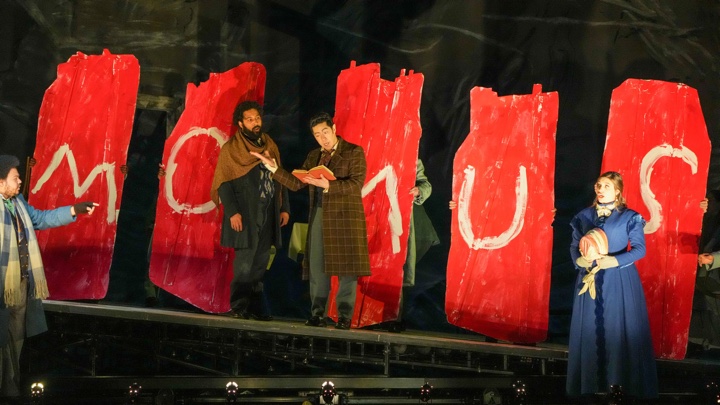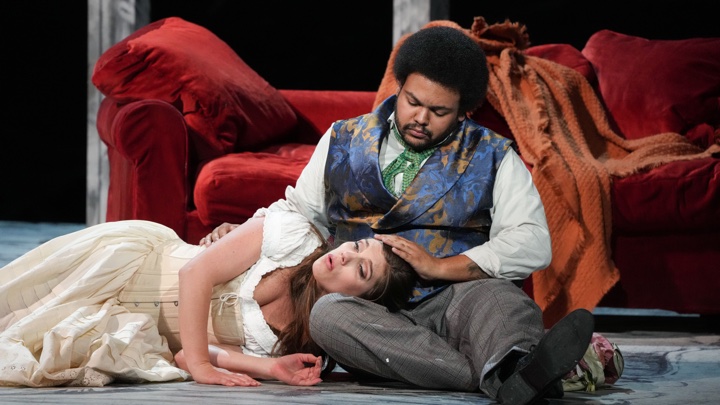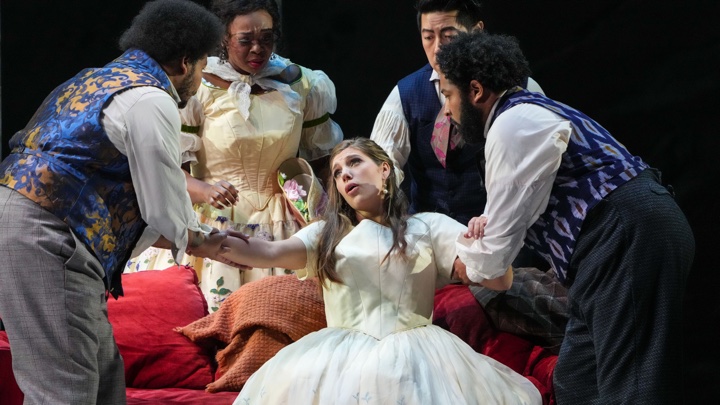
Sharon’s reordering is surely the boldest and most discussed aspect of his production, and for me it’s effective. For me and many opera lovers, Bohème is a very familiar work—but seeing it this way sharpened my perceptions of the individual relationships and changing circumstances.
Speaking of Merrily, which famously meant that Stephen Sondheim created “reprises” of songs that were actually heard first, something that struck me anew here is the marvelous way in which Puccini develops signature melodic ideas for characters and places—his version of Leitmotifs. And of course, there’s special poignance to seeing what appears to be a happy ending yet is anything but.
Ah, but there’s more going on here than just the revised timeline. Problematically, Sharon seems to want it both ways—to deliver a Bohème that is both innovative and traditional. It’s an honorable goal in theory, but the fundamental staging of scenes—on a huge, slanted, revolving disc (John Conklin is the scenic designer)—often lacks specificity and detail.
Costumed stagehands on the sides are distracting and don’t make sense within most of the scenes. Interpreting Schaunard and Colline as a gay couple is promising, but apart from some occasional background handholding, it’s barely visible. All the characters—and the singers playing them—would benefit from a more actor-based directorial vision.
And then, there’s the narrator: a device clearly intended to help the audience connect the dots of the sequencing. Called “The Wanderer,” I half expected Wotan to show up, but as seen here, it’s embodied by actor Anthony Martinez-Briggs with an irritating hipster overlay, throwing in comments at inopportune moments. In any case, it’s unnecessary: we can easily figure things out on our own.
More generally, I wish Sharon trusted both the audience and his own instincts more, and was also more audacious. By far the best sequence in this Bohème—the Café Momus, which has the wild intensity of a feverish dream—is, not coincidentally, the most extreme.
If there’s less to say about the musical side, it’s because this is a very nicely done Bohème that hits the right notes without quite knocking it out of the park. Joshua Blue, an appealing presence on stage, is an ardent, full-voiced Rodolfo—a role he will also sing this summer at Glimmerglass.
Kara Goodrich (Mimi), a recent AVA alumna, is especially effective in the conversational passages, where she shows a warmly colored midrange and sense of morbidezza. The top notes are secure but would benefit from more float. Troy Cook is a mellifluous, characterful Marcello; Melissa Joseph a theatrically vivid and funny Musetta whose lyric soprano was sometimes stressed—an off-night, perhaps.
Adam Lau was a sonorous, rich-voiced Colline, who made something notable of the coat scene (in this case, he seemed to be selling not his own coat, but Schaunard’s (well sung here Benjamin Taylor)! The others all did well, as did the excellent chorus. Conductor Corrado Rovaris (who is also Opera Philadelphia’s Musical Director) emphasized the lyricism of the score, which suited the production and this youthful cast.
Photos by Steven Pisano




